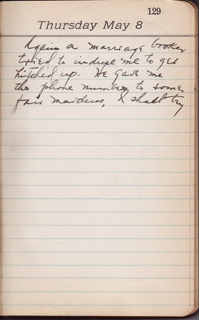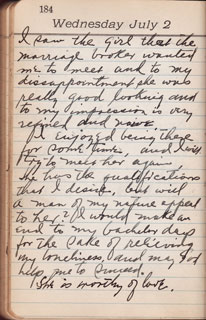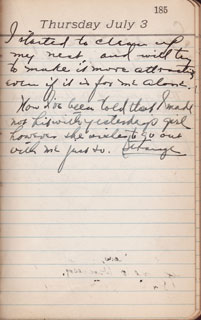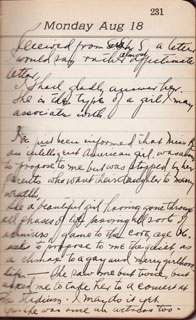
Again a marriage broker
tried to induce me to get
hitched up. He gave me
the phone numbers to some
fair maidens. I shall try.
————–
Matt’s Notes
Since my wife Stephanie sings the entire soundtrack to Fiddler on the Roof at least once during any long car ride (and we take a long car ride at least once a week) it’s hard for me to read about Papa’s marriage broker and not have the song “Matchmaker, Matchmaker” running through my head.
As you’ll recall, Fiddler‘s Yente faced a challenge as a new generation of young people who preferred to choose their own mates threatened the importance of her profession. Papa’s matchmaker (that’s shatkhn in Yiddish, so if you know someone named Shatkin, chances are their Anglicized name reflects a matchmaking heritage in Eastern Europe) must have struggled with an even more difficult cultural moment, since young Jews in America — even those right from the old country like Papa — were learning to date, eat in restaurants, congregate, go out in public and dress like any other Americans.
Papa certainly displayed some old-school attitudes toward dating, as his formal letter of affection to the “20th Century Girl” proved, so I’m sure he wouldn’t have dismissed the efforts of the shatkhn. Still, we’ve seen him balk a bit at blind dates because (I think) his poetic heart demanded a romance with more dramatic, sincere origins, so he most likely pored through the shatkhn’s catalog with some reluctance. I think, too, his skeptical attitude comes through in his use of the term “hitched up” and the phrase “He gave me the phone numbers to some fair maidens,” making this just about the only entry to date in which Papa employed American vernacular or irony.
All in all I think we see, in this account of Papa’s grudging interaction with the shatkhn, a well-preserved example of how Lower East Side Jews of the 1920’s started to shift, in their attitudes and behavior, away from the old country and into the new.




